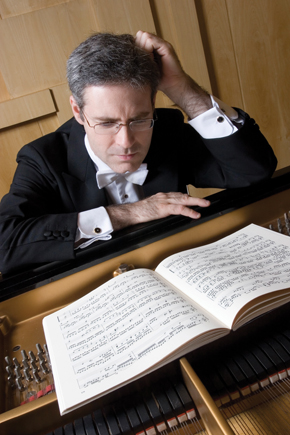
Personal archivesMonteiro, during a master class at USP: academic activity means he practices the piano only in the eveningsPersonal archives
Rio de Janeiro pianist Eduardo Monteiro speaks with satisfaction about his “troubled life.” As a professor, concert pianist, and researcher, even he was surprised that he felt comfortable as head of the Department of Music at the School of Communications and Arts of the University of São Paulo (ECA-USP), a position he held in 2013. The administrative experience was so satisfying that Monteiro immediately accepted the post of vice director of the ECA, which he still holds. “I only practice the piano at night and on weekends,” he says. “I can’t study as hard as I used to when I was 20 or 25 but, on the other hand, experience helps.”
Like most concert pianists, Monteiro began to play in early childhood. At 14 he already knew that piano would be his career. This was confirmed later when he won a series of awards in important competitions in Brazil and abroad. In 1989, at age 23, he was unanimously ranked in first place in the Cologne International Piano Competition, in Germany and also received the award as the best interpreter of Beethoven. Monteiro says this was a crucial point in his career. “That was when I realized that I might be able to do something in that field,” he says, not without some irony since by that time he had already obtained his bachelor’s degree in music from the Federal University of Rio de Janeiro (UFRJ) and, strictly speaking, had never seriously thought about pursuing professional activity in any other field. Subsequently he earned a master’s degree in Keyboard Instruments at UFRJ, a doctorate in History of Music and Musicology at the Paris-Sorbonne University—his dissertation was on the works of Brazilian composer Henrique Oswald (1852-1931)—and a two-year stay in the Artist Diploma program at the New England Conservatory of Music, in Boston.

Júlio AcevedoMonteiro, before a performance: on the horizon, five concerts and the recording of a CDJúlio Acevedo
Those two experiences, one in the area of research (the Sorbonne) and the other in performance (Boston), enabled the pianist to “wrap up the concepts and think about how the piano should be played.” In 2002, he began to give classes at the ECA. “At first it wasn’t easy for me to fit into the university milieu,” says Monteiro. “We are trained to give classes on the instrument. Very few people dedicate themselves to training researchers, but I began to realize that going deeper into that area could be extremely enriching.” This does not mean that his performances in Brazil and abroad have become less frequent.
Monteiro is conducting projects that study the interpretation of the piano repertoire. This means identifying and writing down the choices that pianists make when they perform a piece. “What I’m doing is formalizing the entire process of performance,” he says. “Every note played is the result of a precise choice, a weighing of options—which may not be obvious to someone who is not in the field—and the combination of good choices made dictates the quality of the execution. This kind of reflection exists in every high-level performance, but is very seldom committed to writing anywhere.” In Monteiro’s first project conducted along those lines, from 2011 to 2012, the subject was the execution of Liszt’s Sonata in B Minor. The study now in progress focuses on Beethoven’s Piano Sonata No. 32, Opus 111, in C Minor.
At the same time, Monteiro is researching Brazilian composers whose works are little known and even less well catalogued. “I have an affinity with the repertoire; I feel very comfortable playing those composers,” he says. In 2007, at a concert at Wigmore Hall in London, he launched Piano Music of Brazil, a CD on the British label Meridian Records that features works by Brazilian romanticist, nationalist and 20th century authors, including an interpretation of Cartas Celestes vol. 1, by Almeida Prado (1943-2010) that garnered high praise from music critics and from the composer himself. In 2013, Monteiro recorded both the Quintet and the Quartet for piano and strings by Henrique Oswald with the São Paulo Ensemble on the Lami label.
Now Monteiro says it is time to research the works by Brazilian composer, conductor, and pianist Alexandre Levy (1864-1892), subject of an extension project begun in 2014 that calls for five concerts and the recording of a CD. The project is coordinated by Monteiro and Professor Luciana Sayure. The repertoire will be interpreted by undergraduate and graduate students from the Music Department at ECA. “Levy’s works are extremely important, because they were influenced by European romanticism and also contain elements that are precursors of the nationalist school,” he says. “Even so, this composer is very little known. His production was never published, recorded or studied.”
Also in 2014, Monteiro, in partnership with Luciana Sayure, organized and taught a piano workshop at USP. For a full week, about 100 people, including piano professors and students, some mere beginners, took turns attending private classes, master classes, concerts, and lectures in which the primary objective was to share practices and information. The idea was the brainchild of Monteiro’s observation of the administration of specific skill tests given for admission to the Department of Music at ECA. “Some applicants have obvious talent; they just have not had the right kind of training,” says Monteiro, who intends to repeat the experiment in 2016.
Republish